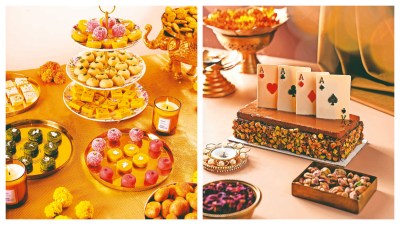For a generation that swears by conscious consumerism, Diwali gifts are no more about following a bland formula. Dry fruits, silver-covered mithai wrapped in yellow cardboard boxes, or mass-market chocolates, which were circulated around the neighbourhood and were predictable, and also, forgettable, are passe. India’s young, urban consumers, armed with rising incomes and a taste for novelty, are now pushing aside soan papdi and terracotta-painted diyas in favour of personalised and artisanal products. They are conscious of what they gift, want things that speak of thought, their identity and values, and are eco-friendly and sustainable.
The shift is visible in the numbers. According to data from Tracxn, India’s online gifting sector now counts 1,244 companies, including 71 backed by $175 million in venture and private equity funding. Fourteen have raised Series A or beyond. While 2016 marked a peak year for company formation, 2025 has already seen a new entrant. Now, a gifting business once dominated by sweets and Ferrero Rocher boxes is coming under a spell of niche brands, like Cinderella turning into a princess.
Storytelling & sustainability
In Noida, Blaire Creatives is rushing to finish 1,500 embroidered fabric boxes before Diwali, including a last-minute corporate order for 450. Founder Nishita Gupta says the company’s signature pastel-hued textile packaging has become its biggest draw. “Everyone’s looking for something thoughtful and keepsake-worthy,” she explains. “Our fabric boxes have become the most sought-after product we offer, and a big reason clients come back to us.”
Her orders, ranging from 50 to 500 boxes at a time, illustrate how even small, young labels can scale during the season. But the appeal lies less in volume than in the promise of uniqueness, a quality that separates these brands from traditional gift houses.
The appetite for customisation is also driving growth at Lemonade India, a brand that has delivered more than 65,000 orders across over 30 countries since its 2019 launch. Its lifestyle products and festive hampers are at the centre of demand, with favourites include personalised drinkware like cappuccino cups, clear mugs, and sippers, alongside customised playing cards, poker chips, and paper embossers.
“Customers are moving beyond standard sweets and candles, leaning into thoughtful, customised options that feel unique and create lasting memories,” says Gunjan Malhotra, its founder. Unlike conventional hampers, Lemonade’s can be tailored and bring these items together with festive details such as personalised ribbons and wax seals which are especially popular for both family gatherings and corporate celebrations. Lemonade’s appeal, Malhotra says, is “making personalisation accessible and premium”.
Food, the backbone of Diwali gifting, is also being reimagined. At Delhi-based Bobo Cakery, founder and pastry chef Mallika Tandon packages desserts in bright boxes, inspired by her favourite artist Piet Mondrian. “I’m obsessed with packaging and loud colours,” she says. The company, which began as a cloud kitchen selling fried chicken before pivoting to sweets, now sees average orders of two dessert boxes and is launching sugar-free and gluten-free options for Diwali.
“Delhiites always gravitate towards egg-free, chocolate-based items,” Tandon notes. “Now there is demand for vegan and gluten-free too.” The result is a dessert business positioning itself as edible art, catering to both indulgence and health-conscious gifting.
In Bengaluru, Nura Studios is blending gifting with craft revival. Founder Pratyusha Mishra works with artisans from Mayurbhanj and Bhubaneswar in Odisha to create terracotta candle jars filled with soy wax and essential oils. Orders have tripled during the festive season, reaching 2,000 this year, with curated hampers of up to 300 pieces requiring weeks of preparation.
“We want to create an experience rather than just gifting,” Mishra says. “It should evoke Indian luxury, rooted in ritual rather than western trends.” For her, Diwali demand is both a sales opportunity and a platform to support rural craftsmen.
Premium crochet brand Kalaa, founded by Ananya, is also navigating its busiest season yet. “This year, we’ve seen a sharp rise in festive gifting sales, especially through our partnerships with quick-commerce platforms,” she says. “Consumers are increasingly looking for unique, handcrafted gifting options that are also available on demand. We’re particularly excited about our custom Diwali gift box designed in collaboration with Blinkit’s category team, which we expect will perform strongly in the run-up to Diwali.”
Ananya notes that Kalaa’s festive purchases “range between Rs 800 and Rs 3,000. Since many are impulse-driven gifting decisions, we consciously design products and hampers at accessible price points, without compromising on craftsmanship.” Most of Kalaa’s demand comes from metro cities, led by Bengaluru, Chennai, Hyderabad, Mumbai and Delhi. “At the same time, we’re seeing rapidly growing traction in Tier-2 cities such as Pune, Indore, and Jaipur, which is very encouraging for us as it reflects how the appeal of handcrafted gifting is expanding beyond the metros.”
The brand also distinguishes itself through storytelling and sustainability. “Every Kalaa piece carries a priceless story of design, heritage, and maker, which resonates deeply with our customers,” says Ananya. “For us, sustainability means creating pieces that don’t need to be discarded and instead become future heirlooms… Every piece in the home of a rural woman in India has multiple lives and that is the bedrock of sustainability for us.” This year, Kalaa has launched crochet pooja flowers that can be repurposed into keepsakes and accessories.
The challenge, she admits, is keeping up with scale. “This is our busiest season yet, and meeting production and packaging timelines for bulk orders can be challenging. That said, we’ve been able to navigate it smoothly thanks to strong advance planning and an agile, committed team that is all hands on deck.”
Scaling the bespoke
These brands illustrate both the promise and the challenge of India’s niche gifting wave. Demand is strong as Tracxn data points to a maturing sector, and founders describe orders arriving earlier, in larger volumes and with more specific requests than in the past. According to Research & Market, India’s gifting market in 2024 was valued at $75.16 billion and is expected to reach $92.32 billion in the next five years. Experts say the market has immense potential, driven by changing consumer preferences and growing awareness of gifting etiquette.
Yet at present, scaling remains complex. Handmade products require longer lead times, perishables such as cookies and sweets need careful logistics, and sustainability often raises costs.
For consumers, though, the rewards are clear. “People often reach out after receiving our boxes, sharing photos and messages about how much they loved them,” says Gupta of Blaire Creatives. “Many of those recipients end up becoming clients themselves.”
As India’s Diwali lights flicker on this year, they will shine not just on homes but on a fast-expanding ecosystem of brands reshaping the season’s commerce. What was once a market for dry fruits and Cadbury assortments is now a proving ground for design-led entrepreneurs, culinary experimenters, craft revivalists and conscious consumers willing to pay for gifts that last beyond the festival.









